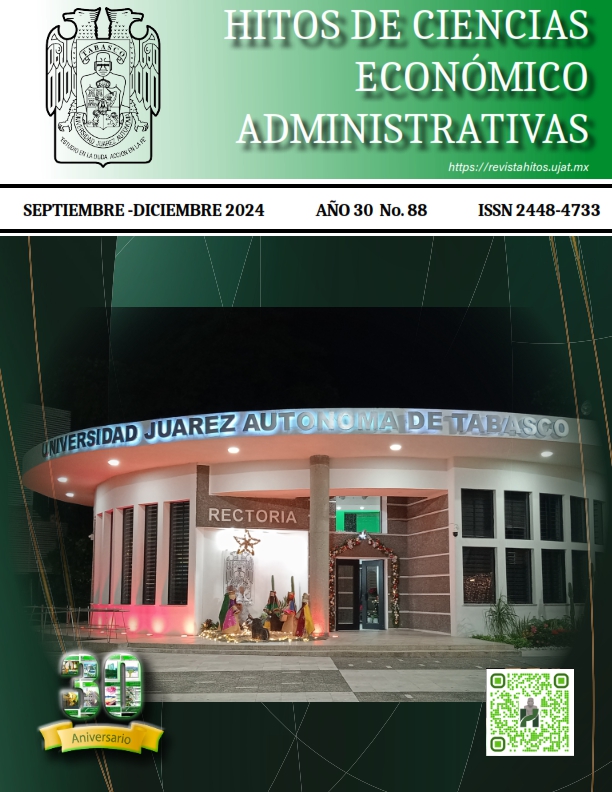Impact of the social programs of the State Social Development Secretariat (SEDESOL) from 2018-2022, on poverty in the State of Yucatan.
DOI:
https://doi.org/10.19136/hitos.a30n88.6344Keywords:
Social programs, Linear regression, Poverty, Public policies.Abstract
OBJECTIVE: To describe the impact of the programs implemented by SEDESOL on the levels of poverty that occur in the state of Yucatan.
MATERIAL AND METHOD: The research approach was quantitative, correlational type, since the statistical information of the social programs that the state SEDESOL has implemented from 2018-2022 was obtained, identifying the beneficiaries, in order to facilitate their analysis, the linear regression was carried out for which the SPSS statistical package was used.
RESULTS: The variables that can have the greatest impact on reducing poverty are increasing people's access to health services, as well as granting more social credits to people to boost their activities.
CONCLUSIONS: Trying to reduce poverty with the programs is possible, as long as it is thought in improving education, health services, food, and access to better income, but it also requires constant monitoring, as well as a correct implementation, to truly benefit those who really need it.
Downloads
References
Abramo, L., Cecchini, S. y Morales, B. (2019). Programas sociales, superación de la pobreza e inclusión laboral: aprendizaje desde América Latina y el Caribe, Santiago de Chile, Editorial CEPAL. https://repositorio.cepal.org/server/api/core/bitstreams/7d9fb18f-1be1-4e0e-9125-0e3de35b5bc7/content
Altimir, O. (2013). Indicadores de desigualdad de mediano plazo en América Latina, Santiago de Chile, Editorial (CEPAL). https://repositorio.cepal.org/server/api/core/bitstreams/4b10723a-4222-43e6-8eee-246ac8caa9ca/content
Badillo, P. (2023). Los programas de transferencias condicionadas en México: Progresa-Oportunidades-Prospera (1997-2019). Revista de Estudios Regionales Nueva Época 1(1), 40-62. https://doi.org/10.59307/rerne1.16.
Boltvinik, J. y Damián, A. (2020). Medición de la pobreza de México: análisis crítico comparativo de los diferentes métodos aplicados. Recomendaciones de buenas prácticas para la medición de la pobreza en México y América Latina, serie Estudios y Perspectivas, Ciudad de México, Editorial CEPAL. https://repositorio.cepal.org/bitstream/handle/11362/45555/1/S2000335_es.pdf
Cárdenas, G. E., Michel, R. M. (2018). Descripción de las teorías del desarrollo económico y desigualdad. Tiempo económico. Universidad Autónoma Metropolitana, 12(40), 53-64. https://tiempoeconomico.azc.uam.mx/wp-content/uploads/2020/01/40te3.pdf
Campos, R. M., Delgado, V. H. y Medina, E. (2020). Política social y combate a la pobreza en México, análisis de la cartilla social. Gestión y política pública. 29(2), 55-386. DOI: https://doi.org/10.29265/gypp.v29i2.777
CONEVAL. (2020). Medición de la pobreza 2016-2018. https://www.coneval.org.mx/Medicion/MP/Paginas/Pobreza_2020.aspx
Comisión Económica para América Latina y el Caribe [CEPAL], (2018). Medición de la pobreza por ingresos: actualización metodológica y resultados, Santiago de Chile Editorial CEPAL. https://www.cepal.org/es/publicaciones/44314-medicion-la-pobreza-ingresos-actualizacion-metodologica-resultados
Garza, J. (2016). Los determinantes de la pobreza en los estados mexicanos en la frontera con Estados Unidos. Estudios fronterizos, 17(33),
https://doi.org/10.21670/ref.2016.33.a06
Giménez, C. y Valente, X. (2016). Una aproximación a la pobreza desde el enfoque de capacidades de Amartya Sen, Provincia (35), 99-149. http://saber.ucv.ve/bitstream/10872/22623/1/Gimenez%20y%20Valente.%20Una%20aproximaci%C3%B3n%20a%20la%20pobreza%20desde%20el%20enfoque%20de%20capacidades%20de%20Amartya%20Sen.pdf
Mayorga, A. (2018). Debates contemporáneos sobre la pobreza: entre causas, representaciones y programas sociales. Trabajo social 20(I), 163-193. http://www.scielo.org.co/scielo.php?script=sci_arttext&pid=S2256-54932018000100163
Marina, J. A., Gerónimo, V. M. y Pérez, J. M. (2018). Efectos de la pobreza y de los factores sociodemográficos en la educación superior: Un modelo probit aplicado a México. Nova Scientia, 10(20), 539-568. https://www.scielo.org.mx/scielo.php?pid=S2007-07052018000100539&script=sci_abstract
Muñoz, J. P. (2015). La pobreza y las políticas públicas: del referencial global al sectorial. Cuadernos del CENDES, 32(88), 99-119. https://www.redalyc.org/articulo.oa?id=40341007005
Parker, W. (2019). La evaluación de progresa-oportunidades-prospera: logros después de veinte años y retos para el futuro. En Hernández Licona, Gonzalo, De la Garza, Thania, Zamudio, Janet. y Yaschine, Iliana (Ed.) (2019). El Progresa-Oportunidades-Prospera, a 20 años de su creación. Ciudad de México: CONEVAL.
Ponce, M. G. (2018). Medición de pobreza multidimensional de la iniciativa en pobreza y desarrollo humano. Revista de Ciencias Sociales, 24(4), 98-109. https://www.redalyc.org/journal/280/28059581008/28059581008.pdf
Ravallion, M. (2016). Toward better global poverty measures. Journal of Economic Inequality, 14. https://doi.org/10.1007/s10888-016-9323-9.
Stezano, F. (2021). Enfoques, definiciones y estimaciones de pobreza y desigualdad en América Latina y el Caribe: un análisis crítico de la literatura, Documentos de Proyectos, Ciudad de México, Editorial CEPAL. https://www.cepal.org/es/publicaciones/46405-enfoques-definiciones-estimaciones-pobreza-desigualdad-america-latina-caribe-un
Vera, F. (2019). La pobreza en México, un estudio con gráficas dirigidas acíclicas. Revista de Ciencias Sociales, 13(47), 130-152. https://dialnet.unirioja.es/servlet/articulo?codigo=7390831
Downloads
Published
Issue
Section
License
Copyright (c) 2024 Universidad Juárez Autónoma de Tabasco

This work is licensed under a Creative Commons Attribution-NonCommercial-ShareAlike 4.0 International License.
As a requirement for the manuscript, the author is requested to provide the Copyright Assignment Letter, so that the Journal has the publication rights and to avoid plagiarism.
PLAGIARISM POLICIES
The Editorial Board of the Journal HITOS DE CIENCIAS ECONÓMICO ADMINISTRAIVAS has the authority to reject in the review process any manuscript that does not have adequate citation in the documents consulted in its scientific research work, which can be considered as plagiarism behaviors. Likewise, the referees carry out the plagiarism review using specialized software, such as iThenticate, among others.
COPYRIGHT POLICIES
Authors who have publications in the journal accept the following terms: • At the time the manuscript is accepted, the author transfers the copyright to the Journal HITOS DE CIENCIAS ECONÓMICO ADMINISTRATIVAS.
- The authors may make additional agreements for non-exclusive distribution of the published version of the article (e.g., including it in an institutional repository or publishing it in a book) provided that the initial publication in this journal is indicated.
- Authors are allowed and recommended to publish their research work on the Internet (eg, institutional or personal files), which would allow more beneficial exchanges to increase the citation of the published work.
This work is licensed under Creative Commons Attribution-NonCommercial-NoDerivatives 4.0 International





